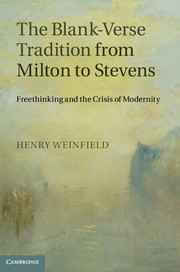The Blank-Verse Tradition from Milton to Stevens Freethinking and the Crisis of Modernity
Langue : Anglais
Auteur : Weinfield Henry

A detailed study of Milton, Wordsworth, Shelley, Keats, Tennyson and Stevens, tracing what lies behind their choice of blank verse.
Blank verse, unrhymed iambic pentameter, has been central to English poetry since the Renaissance. It is the basic vehicle of Shakespeare's plays and the form in which Milton chose to write Paradise Lost. Milton associated it with freedom, and the Romantics, connecting it in turn with freethinking, used it to explore change and confront modernity, sometimes in unexpectedly radical ways. Henry Weinfield's detailed readings of the masterpieces of English blank verse focus on Milton, Wordsworth, Shelley, Keats, Tennyson and Stevens. He traces the philosophical and psychological struggles underlying these poets' choice of form and genre, and the extent to which their work is marked, consciously or not, by the influence of other poets. Unusually attuned to echoes between poems, this study sheds new light on how important poetic texts, most of which are central to the literary canon, unfold as works of art.
Introduction: blank-verse freethinking and its opponents; 1. 'In wand'ring mazes lost': skepticism and poetry in Milton's infernal conclave (Paradise Lost, Book 2); 2. 'With serpent error wand'ring found thir way': Milton's counterplot revisited (Paradise Lost, Book 7); 3. 'Man's mortality': Milton after Wordsworth (Paradise Lost, Book 10); 4. 'These beauteous forms': 'Tintern Abbey' and the post-Enlightenment religious crisis; 5. 'Knowledge not purchased by the loss of power': Wordsworth's meditation on books and death in Book 5 of The Prelude; 6. 'Who shall save?' Shelley's quest for the Absolute in A Defence of Poetry and Alastor; 7. Keats and the dilemmas of modernity in the Hyperion poems; 8. 'Of happy men that have the power to die': Tennyson's 'Tithonus'; 9. Stevens' anatomy; Bibliography.
Henry Weinfield is a professor in the Program of Liberal Studies at Notre Dame University.
Date de parution : 06-2012
Ouvrage de 264 p.
15.8x23.5 cm
Date de parution : 03-2015
Ouvrage de 266 p.
15.2x22.9 cm
Thème de The Blank-Verse Tradition from Milton to Stevens :
© 2024 LAVOISIER S.A.S.



